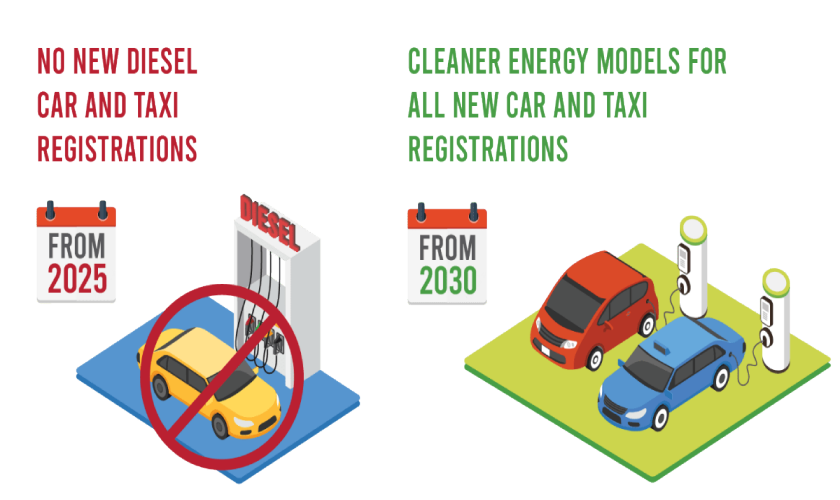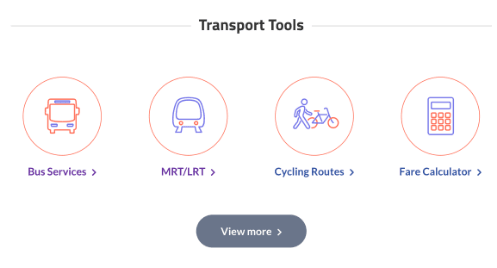Thinking of transitioning to an Electric Vehicle? Please refer to the categories below for more information.
Transitioning to EVs
Transitioning to EVs

All new car registrations will have to be of cleaner-energy models from 2030. Cleaner-energy models include electric, hybrid or hydrogen fuel cell cars. We will also stop new diesel car registrations from 2025.
Incentives for Cleaner-Energy Vehicles and Charger Deployment
| Incentive | Details |
Newly registered fully-electric cars and taxis will receive 45% rebate off the Additional Registration Fee (ARF). From 1 Jan 2024 to 31 Dec 2025, the rebate will be capped at $15,000. From 1 Jan 2026 to 31 Dec 2026, the rebate will be capped at $7,500. EEAI will cease from 1 Jan 2027. |
|
| Enhanced Vehicular Emissions Scheme (VES) | From 1 Jan 2025 to 31 Dec 2025, VES Band A1 rebate for cars will be $25,000. VES Band A2 rebate for cars will be $2,500. From 1 Jan 2026 to 31 Dec 2026, VES Band A rebate for cars will be lowered to $22,500. From 1 Jan 2027 to 31 Dec 2027, VES Band A rebate for cars will be further lowered to $20,000. |
| Commercial Vehicle Emissions Scheme (CVES) | Commercial vehicles are categorised into three bands resulting in a $15,000 surcharge for the most pollutive vehicles to $20,000 incentive for the least pollutive vehicles. This encourages buyers to choose commercial vehicle models that have lower emissions across the identified pollutant categories, effective from 1 April 2025 to 31 March 2027. |
| Enhanced Early Turnover Scheme (ETS) | ETS provides a discount off the Prevailing Quota Premium when owners of older diesel commercial vehicles and buses switch to cleaner new vehicles. For Light Commercial Vehicles, ETS ceased on 31 Mar 2025. For Heavy Commercial Vehicles, ETS will cease after 31 Dec 2025. |
| Heavy Vehicle Zero Emissions Scheme (HVZES) | From 1 Jan 2026 to 31 Dec 2028, owners who register a zero-tailpipe emissions heavy goods vehicle or bus will be eligible for a $40,000 incentive. |
| Electric Vehicle Common Charger Grant (ECCG) | From 29 Jul 2021 to 31 Dec 2026, the ECCG will co-fund the installation of 3,500 EV chargers at Non Landed Private Residences. The first 2,000 chargers will be eligible for co-funding up to a cap of $4,000 per charger, while the subsequent 1,500 chargers will have a reduced co-funding cap of $3,000 per charger. |
| Electric Heavy Vehicle Charger Grant (EHVCG) | From 1 Jan 2026 to 31 Dec 2028, the EHVCG will co-fund up to 50% of the installation costs for eHV charger, capped at $30,000 per charger. The grant will be available for the first 500 chargers, with a limit of three chargers per site. Companies must purchase at least one eHV with each charger, and the charger must be deployed at the owner’s place of business. The charger must be installed at designated lorry or coach lots and have a minimum power rating of 50kW. |
In addition to the incentives above, we have also revised the road tax framework and increased the maximum power output threshold of Category A COE cars to make EVs more attractive. The road tax for fully electric cars in the 90-230kW bracket has been reduced since 1 January 2022, to ensure that electric and ICE cars of similar makes and luxury level pay similar road tax. Category A Maximum Power Output threshold for electric cars has been revised from 97kW to 110kW to allow more mass market electric cars to come under Category A.
Publicly Accessible Charging Points
You can now find out more about publicly accessible charging stations in Singapore, including the real-time availability of EV charging points, through the MyTransport.SG (iOS | Android) mobile application. Information on publicly accessible charging points are just a few taps away!
Design of EV Charging Lots
To facilitate easy recognition of EV charging lots for drivers, LTA strongly promotes the standardisation of the EV charging lot design.

For more information, please refer to the Advisory on the Standardisation of EV Charging Lot Design for EVCOs (PDF, 261kB) and Developers (PDF, 262kB).
Widening Coverage of Accessible EV Charging Points
To future-proof developments to support the charging needs of a largely electrified vehicle population in steady state, developments that undergo specified building or electrical works will be required to provide for EV charging under the Electric Vehicles Charging Act (EVCA).
Specified works for provisions by developments
These specified works are:
- Building works that (i) erect or re-erect a building or (ii) increase the approved gross floor area (GFA) of a developmnet by at least 50%; and
- Electrical works that result in an approved electrical load of more than 280 kilo-volt ampere (kVA).
Minimum EV charging provisions required
This requirement will apply to developers of specified building works, and development owners of specified electrical works. Developers/development owners will be required to install the following EV charging infrastructure:
- Electrical infrastructure (i.e. at the consumer switch room(s) and/or substation(s)) to supply power exclusively to EV charging points within the development, with at least 1.3kVA catered for each car and motorcycle parking lot in the development (‘passive provision’);
- EV charging points that are fully wired and ready for use by EVs, where the total electrical load or power of all EV charging points installed must be at least 20% of the passive provision required (‘active provision’). These can comprise a mix of charging points with different power ratings, depending on user needs.
Developments not subjected to EV charging requirements
The requirements for active and passive provisions do not apply to the following categories of developments
- Any building or electrical works carried out by or on behalf of the Government on State land;
- Any building or electrical works carried out by or on behalf of any public authority on land owned by that public authority; or
- Any building or electrical works carried out in connection with any development specified in Part 4 of the Schedule to the Parking Places (Provision of Parking Places and Parking Lots) Rules 2018;
The requirement for active provision does not apply to any building or electrical works that would result in fewer than 8 parking lots within the parking place of the development.
For more information, please refer to the Guidelines for the Minimum EV Charging Provisions in Developments (PDF, 673kB).
Ensuring Reliability of EV Charging Services
To ensure EV charging network reliability, EV Charging Operators (EVCOs) who provide EV charging services or operate EV charging stations serving members of public (incl. chargers in condominiums used by residents/visitors, chargers in buildings used by staff/visitors) will be required to obtain a licence under the EVCA. This will include EVCOs who provide the following services:
- Hiring out fixed chargers
- Providing EV battery swapping services
- Renting out non-fixed chargers
Chargers operated by landed homeowners to charge their households’ vehicles, or chargers operated by fleet owners to charge vehicles in their fleets do not require a licence. Operators who operate EV chargers on behalf of fleet owners or landed homeowners will still be required to obtain an EVCO licence.
Licences are valid for a period of 3 years and can be renewed upon its expiry. Refer to the list of operators who have obtained an EVCO licence (PDF, 75kB).
















